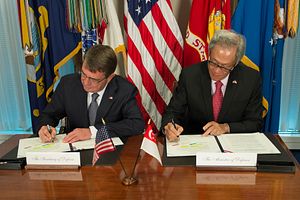This weekend, Singapore’s defense minister again issued an ominous warning about the rising threat from terrorism in Southeast Asia.
Ng Eng Hen told reporters following the U.S.-ASEAN Defense Ministers’ Informal Meeting in Hawaii that the threat that violent extremist groups pose to the region continues to grow each year.
“Every year we meet, the situation and threat from extremist terrorism rises,” Ng said. “And by that I mean, compared to, say, a year or even two years ago, they are more organized… they are more networked, they are clearer in their articulation of what they want to achieve.”
Ng’s remarks were just the latest in a string of comments from Singaporean officials on the rising terrorism threat. At last year’s Shangri-La Dialogue, Asia’s premier security summit, Singapore’s Prime Minister Lee Hsien Loong had raised the prospect of the Islamic State (IS) establishing a base somewhere in Southeast Asia (See: “Singapore Warns of Islamic State Base in Southeast Asia”).
Last December, during a trip to the United States, Ng himself warned of a nexus between the Islamic State and other local terror groups (See: “Singapore Warns of Islamic State Terror Nexus in Southeast Asia”) as fighters return home to Southeast Asia.
This year, the warnings by Singaporean officials have gotten even more serious. Several officials including Minister for Law and Home Affairs K Shanmugam and Senior Minister of State for Defense and Foreign Affairs Mohamad Maliki Osman have warned that terrorism poses a threat not only to the safety of some Singaporeans, but the country’s harmonious, multi-racial society.
That is not without reason. The Jakarta bombings in January 2016 signaled the growing reach of IS into Southeast Asia, while the foiling of a plot by Indonesian authorities in August of terror suspects planning an attack on Singapore’s Marina Bay revealed the extent to which the city-state itself could be under threat (See: “Islamic State Attack in Indonesia? A Look at the Jakarta Bombings”).
In his remarks to reporters, Ng again referenced the foiled plot and said that it was a clear example of IS moving beyond networks to push funds and weapons to planning attacks.
“It is uppermost in all our minds, ASEAN states, and there are good reasons for it,” he said.
Singapore’s response to this rising threat is already quite robust. At home, it is undertaking a series of initiatives including arresting suspects, tightening security checks, and raising public awareness to fight the extremist narrative. Beyond this, recognizing that it cannot combat this alone, Singapore has also stepped up cooperation with other intelligence agencies, convened conferences to share best practices, and even joined and contributed to the U.S.-led Global Coalition Against ISIL.
But the city-state continues to look for opportunities to do even more. When Lee visited the United States last month, he said Singapore would deploy a medical team to Iraq for around three months in 2017 as part of its deepening contribution to the fight against IS (See: “Strengthening US-Singapore Strategic Partnership”).
Singapore has also offered for its Information Fusion Center (IFC) to support information-sharing in support of the Sulu Sea trilateral patrols that Malaysia, the Philippines and Indonesia have agreed to (See: “Confronting Threats in the Sulu-Sulawesi Seas: Opportunities and Challenges”).

































